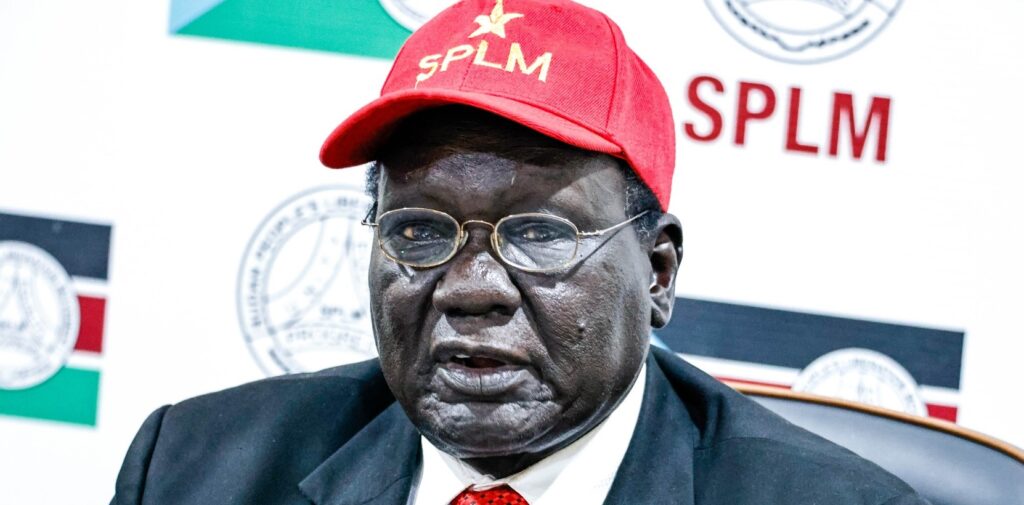South Sudan’s ruling party has accused a former senior member of betrayal after he resigned and launched a new political movement, marking a significant split within the country’s political elite.
The Sudan People’s Liberation Movement (SPLM) said the defection of Nhial Deng Nhial, a veteran minister and diplomat, was “deeply disappointing” and politically motivated. The reaction came after Nhial announced last week that he was suspending his SPLM membership to form the South Sudan Salvation Movement (SSSM).
In an 18-page declaration, Nhial, a member of the SPLM’s Political Bureau, sharply criticized President Salva Kiir’s administration over corruption, insecurity and its failure to hold long-delayed elections. He said his new movement aimed to reclaim the SPLM’s founding ideals, which he accused the current leadership of abandoning.
Speaking at a press conference in Juba on Wednesday, SPLM Secretary for Political Affairs, Mobilization and Organization Bol Makueng Yol said the party was “shocked” by Nhial’s decision.
“It is deeply disappointing that Hon. Nhial, a founding and senior member of the SPLM, has chosen to turn his back on the movement that shaped his political career,” Makueng said. “His allegations of government failure, corruption, and lack of disarmament are unfounded and politically motivated.”
The public fallout exposes growing divisions within the SPLM, which has ruled South Sudan since independence from Sudan in 2011. The split comes amid mounting political uncertainty in the world’s youngest nation.
Makueng recounted Nhial’s long service within the SPLM, including his role as a lead negotiator for the 2005 Comprehensive Peace Agreement, which paved the way for independence. Nhial has held several ministerial posts, including regional cooperation, defence, foreign affairs and presidential affairs.
The SPLM official said Nhial had ample opportunity to address the same challenges he now blames on the party’s leadership, citing his time as defence minister from 2008 to 2011.
“When he was Minister of Defence between 2008 and 2011, the country experienced several violent conflicts in Jonglei, Warrap and Lakes states. What comprehensive security plan did he implement then?” Makueng asked. “He was often away attending Arsenal football matches while the President managed local crises.”
Makueng also rejected Nhial’s claim that the SPLM is deliberately delaying elections, which have been repeatedly postponed. The first presidential polls are now scheduled for December 2026.
“The SPLM leadership does not fear elections. We are prepared for the 2026 polls,” he said. “The extension to December 2026 was a consensus decision among peace partners under the Revitalized Agreement on the Resolution of the Conflict in South Sudan.”
He added that Nhial automatically forfeited his SPLM membership and his seat in the Reconstituted Transitional National Assembly after announcing his new party, in line with the SPLM constitution.
The SPLM also denied allegations that it had ordered the arrest of Nhial’s supporters.
“SPLM does not arrest people. If anyone is detained, that is the responsibility of government security organs, not the party,” Makueng said.
He further alleged that Nhial’s new movement has links to the United People’s Alliance, a coalition of opposition figures the SPLM accuses of maintaining armed groups.
“By aligning with such groups, Nhial is associating himself with those who want to gain power through violence rather than democracy,” Makueng warned.
Defending the party’s record, Makueng credited Kiir with steering South Sudan to independence and dismissed claims that the SPLM lost direction after the death of its founder, Dr. John Garang.
“Comrade Salva Kiir carried forward Dr. Garang’s vision under extreme provocation,” he said. “Those claiming the SPLM abandoned its mission are ignoring history.”
He urged SPLM members and citizens to reject division and avoid violence.
“We advise Hon. Nhial to organize his new party along democratic lines and avoid inciting violence among South Sudanese,” Makueng said. “We don’t want South Sudanese to die again.”




